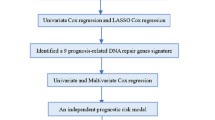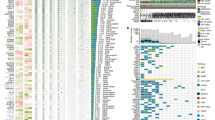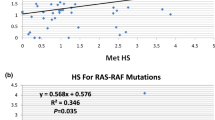Abstract
Metastasis is the major cause of cancer mortality. We aimed to find a metastasis-prone signature for early stage mismatch-repair proficient sporadic colorectal cancer (CRC) patients for better prognosis and informed use of adjuvant chemotherapy. The genome-wide expression profiles of 82 age-, ethnicity- and tissue-matched patients and healthy controls were analyzed using the Affymetrix U133 Plus 2 array. Metastasis-negative patients have 5 years or more of follow-up. A 10 × 10 two-level nested cross-validation design was used with several families of classification models to identify the optimal predictor for metastasis. The best classification model yielded a 54 gene-set (74 probe sets) with an estimated prediction accuracy of 71%. The specificity, sensitivity, negative and positive predictive values of the signature are 0.88, 0.58, 0.84 and 0.65, respectively, indicating that the gene-set can improve prognosis for early stage sporadic CRC patients. These 54 genes, including node molecules YWHAB, MAP3K5, LMNA, APP, GNAQ, F3, NFATC2, and TGM2, integrate multiple bio-functions in various compartments into an intricate molecular network, suggesting that cell-wide perturbations are involved in metastasis transformation. Further, querying the `Connectivity Map’ with a subset (70%) of these genes shows that Gly-His-Lys and securinine could reverse the differential expressions of these genes significantly, suggesting that they have combinatorial therapeutic effect on the metastasis-prone patients. These two perturbagens promote wound-healing, extracellular matrix remodeling and macrophage activation thus highlighting the importance of these pathways in metastasis suppression for early-stage CRC.



Similar content being viewed by others
Explore related subjects
Discover the latest articles and news from researchers in related subjects, suggested using machine learning.References
Chia KS, Seow A, Lee HP et al (2000) Cancer incidence in Singapore 1993–1997. Singapore Cancer Registry Report: No. 5
Wang Y, Jatkoe T, Zhang Y et al (2004) Gene expression profiles and molecular markers to predict recurrence of Dukes’ B colon cancer. J Clin Oncol 22:1564–1571
De Gramont A, Boni C, Navarro M et al (2007) Oxaliplatin/5FU/LV in adjuvant colon cancer: updated efficacy results of the MOSAIC trial, including survival, with a median follow-up of six years. Proc AM Soc Clin Oncol 25:165s (suppl; abstr 4007)
O’Dwyer PJ, Eckhardt SG, Haller DG et al (2007) Priorities in colorectal cancer research: recommendations from the Gastrointestinal Scientific Leadership Council of the Coalition of Cancer Cooperative Groups. J Clin Oncol 25:2313–2321
Bild AH, Potti A, Nevins JR (2006) Linking oncogenic pathways with therapeutic opportunities. Nat Rev Cancer 6:735–741
van’t Veer LJ, Dai H, van de Vijver MJ et al (2002) Gene expression profiling predicts clinical outcome of breast cancer. Nature 415:530–536
Barrier A, Boelle P, Roser F et al (2006) Stage II colon cancer prognosis prediction by tumor gene expression profiling. J Clin Oncol 24:4685–4691
Garman KS, Acharya CR, Edelman E et al (2008) A genomic approach to colon cancer risk stratification yields biologic insights into therapeutic opportunities. Proc Natl Acad Sci USA 105:19432–19437
Kruhoffer M, Jensen JL, Laiho P et al (2005) Gene expression signatures for colorectal cancer microsatellite status and HNPCC. Br J Cancer 92:2240–2248
Giacomini CP, Leung SY, Chen X et al (2005) A gene expression signature of genetic instability in colon cancer. Cancer Res 65:9200–9205
Watanabe T, Kobunai T, Toda E et al (2006) Distal colorectal cancers with microsatellite instability (MSI) display distinct gene expression profiles that are different from proximal MSI cancers. Cancer Res 66:9804–9808
Hong Y, Ho KS, Eu KW et al (2007) A susceptibility gene set for early onset colorectal cancer that integrates diverse signalling pathways: implication for tumorigenesis. Clin Cancer Res 13:1107–1113
Varma S, Simon R (2006) Bias in error estimation when using cross-validation for model selection. BMC Bioinform 7:91
Ambroise C, McLachlan GJ (2002) Selection bias in gene extraction on the basis of microarray gene-expression data. Proc Nat Acad Sci USA 99:6562–6566
Lamb J, Crawford ED, Peck D et al (2006) The connectivity map: using gene-expression signatures to connect small molecules, genes, and disease. Science 313:1929–1935
Lamb J (2007) The connectivity map: a new tool for biomedical research. Nat Rev Cancer 7:54–60
Ramaswamy S, Ross KN, Lander ES et al (2003) A molecular signature of metastasis in primary solid tumors. Nat Genet 33:49–54
Jones S, Chen W, Parmigiani G et al (2008) Comparative lesion sequencing provides insights into tumor evolution. Proc Natl Acad Sci USA 105:4283–4288
Minn AJ, Gupta GP, Siegel PM et al (2005) Genes that mediate breast cancer metastasis to lung. Nature 436:518–524
Wittner BS, Sgroi DC, Ryan PD et al (2008) Analysis of the MammaPrint breast cancer assay in a predominantly postmenopausal cohort. Clin Cancer Res 14:2988–2993
Vilar E, Mukherjee B, Kuick R et al (2009) Gene expression patterns in mismatch repair-deficient colorectal cancers highlight the potential therapeutic role of inhibitors of the phosphatidylinositol 3-kinase-AKT-Mammalian target of Rapamycin pathway. Clin Cancer Res 15:2829–2839
Simeon A, Emonard H, Hornebeck W et al (2000) The tripeptide-copper complex glycyl-l-histidyl-l-lysine-Cu2+ stimulates matrix metalloproteinase-2 expression by fibroblast cultures. Life Sci 67:2257–2265
Pickart L (2008) The human tri-peptide GHK and tissue remodelling. J Biomater Sci Polym Ed 19:969–988
Dong NA, Gu ZL, Chou WH et al (1999) Securinine induced apoptosis in human leukemia HL-60 cells. Zhongguo Yao Li Xue Bao 20:267–270
Lubick K, Radke M, Jutlia M (2007) Securinine, a GABAA receptor antagonist, enhances macrophage clearance of phase II C.burnetii: comparison with TLR agonists. J Leukoc Biol 82:1062–1069
Acknowledgments
The authors thank Ms. Yu Hui Wong, Mr. Huashi Ding and Dr. Soo Chin Liew for technical assistance, the Department of Clinical Research, SGH for the use of the Affymetrix Fluidics station, and the Singapore Polyposis Registry for clinical data retrieval. This work is supported in part by a grant from the National Medical Research Council, Singapore (NMRC/0988/2005) to P.Y. Cheah.
Author information
Authors and Affiliations
Corresponding author
Electronic supplementary material
Below is the link to the electronic supplementary material.
Rights and permissions
About this article
Cite this article
Hong, Y., Downey, T., Eu, K.W. et al. A ‘metastasis-prone’ signature for early-stage mismatch-repair proficient sporadic colorectal cancer patients and its implications for possible therapeutics. Clin Exp Metastasis 27, 83–90 (2010). https://doi.org/10.1007/s10585-010-9305-4
Received:
Accepted:
Published:
Issue Date:
DOI: https://doi.org/10.1007/s10585-010-9305-4




